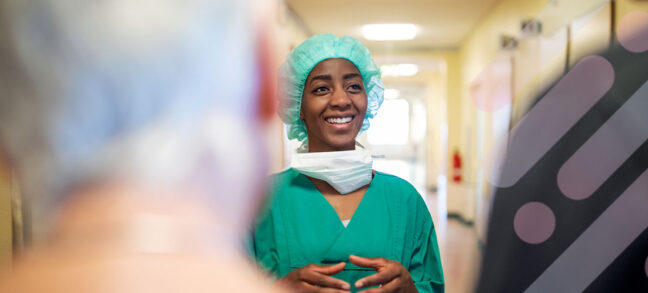After a mastectomy, many women feel relieved to be cancer-free and look forward to focusing on their future and simply enjoying life. But with this new chapter comes more decisions, including whether to have breast reconstruction.
By having a full understanding of the many breast reconstruction options available, and choosing a plastic surgeon who offers the latest breast reconstruction techniques, women can empower themselves to make decisions that can lead to the best possible outcomes.1
You will likely need to interview several plastic surgeons before deciding on the right fit for you. Your surgeon should have the right qualifications and a willingness to engage in shared decision-making. Shared decision-making involves you taking an active role in your treatment plan with your doctor. Your doctor needs to take into account your values, preferences and goals. He or she also needs to be prepared to answer all of your questions and lay out all of your options in a clear and understandable way. Together, you can make educated decisions regarding your breast reconstructive surgery and care.
“Sometimes patients will say, ‘I’ll do whatever you advise,’” said Dr. Constance Chen, a board-certified plastic surgeon in New York City who offers both implant-based reconstructions and autologous (free flap) reconstructions using natural tissue. “My advice is that breast reconstruction is not a one-size-fits-all, cookie-cutter type of procedure. Each type of breast reconstruction has its pros and cons, and each person has a different situation. My job is to educate you, and your job is to look inside yourself to do some soul-searching and figure out what is right for you.”
After all, you are the one who will live with the results and outcome of your surgery. Whenever possible, plastic surgeons should present women with a range of options and encourage them to make the final decision, added Dr. Chen, who also offers women the possibility of having sensation restored as part of free flap breast reconstruction.
Know your breast reconstruction options now to possibly avoid regrets later
There are several types of breast reconstruction: with implants using either saline or silicone; autologous (or free flap) reconstruction using tissue from another part of the body; or a method that combines both implants and autologous tissue. Not every surgeon has the right experience or will excel at every type of breast reconstruction surgery. Surgeons who don’t perform a particular type of reconstruction may not even discuss it with you. By being well-informed about the different types of reconstruction available, women can be sure they are choosing from the full range of options available.
Women should also know that after a mastectomy, it’s common to experience a loss of sensation in the chest area. The reason for the loss of feeling is that during the mastectomy, the breast tissue is removed, severing the nerves that provide feeling to the breast, skin and nipple. When nerves are severed, nerve signals are disrupted. This usually results in numbness and loss of feeling in the breast area. Breast reconstruction surgery typically focuses on the size, shape, symmetry and softness of the breasts, with sensation being the missing component. However, through a surgical technique called Resensation plastic surgeons can potentially restore sensation to the breasts as part of reconstruction.
Resensation uses allograft nerve tissue to reconnect and bridge the gap between the nerves in your chest and the nerves in your reconstructed breast tissue. Over time, sensation is potentially restored to the breast.
“Just like there are laws now in certain states that say patients must be educated on their reconstructive options, Resensation is something that patients should know about because it’s out there for them,” said Dr. Jules Walters, a board-certified plastic surgeon in New Orleans. “I think it’s so important to get this information to patients as fast as we can once they’re diagnosed with breast cancer because that’s when they’re making a lot of decisions very quickly. If they don’t have all of the information, sometimes they’re making decisions without the appropriate information, which can impact the rest of their life.”

Selecting a plastic surgeon for breast reconstruction
Whichever breast reconstruction option you select, your surgeon should be experienced and highly trained to perform your particular type of breast reconstruction surgery.
When choosing a plastic surgeon, select a plastic surgeon who is board certified by the American Board of Plastic Surgery, which requires six years of specialty training to qualify for certification. To be sure your surgeon is board-certified, you can verify their certification through the American Board of Medical Specialties.2 A board-certified plastic surgeon will also likely be a member of the American Society of Plastic Surgeons (ASPS). ASPS members are required to meet strict standards and go through extensive specialized training and education.3 Checking this information may be important because there are some surgeons offering plastic surgery services who may be board certified in another specialty, but are not board certified specifically in plastic surgery.4
Depending on the type of surgery you opt for, you may need a plastic surgeon who has expertise in microsurgery and is skilled in techniques, such as Resensation, that entail using microscopes and precision instrumentation to repair blood vessels, nerves and other intricate structures – a skill that is important in free flap reconstruction.5
In addition to board certification, you need to make sure your surgeon accepts your health insurance and is willing to work closely with your insurance provider if needed.
When you decide which plastic surgeons to meet with for consultations, having an idea of which type of breast reconstruction surgery you want and whether you are interested in Resensation can help you in choosing a surgeon. The right information can also help you feel empowered to make an informed decision with a treatment plan and results that most closely match your priorities and preferences.
Breast cancer and breast reconstruction is a difficult journey. While you’re going through it, your relationship with your plastic surgeon is extremely important and must be based on trust, communication and a commitment to doing what is absolutely best for your unique needs and personal goals.
Find a surgeon who performs Resensation here.
_________________________
1https://www.ncbi.nlm.nih.gov/pmc/articles/PMC2884726/
2https://www.abms.org/verify-certification/
3https://www.plasticsurgery.org/patient-safety/asps-member-qualifications
4https://www.breastcancer.org/treatment/surgery/reconstruction/finding-surgeon
5 https://www.plasticsurgery.org/reconstructive-procedures/microsurgery
Resensation Articles

How does mastectomy impact the nerves in the breast?
One sometimes overlooked aspect of mastectomy is its impact on nerves. Read what happens to nerves during mastectomy and explore…
Read More
What happens during implant breast reconstruction with Resensation®?
By repairing sensory nerves, Resensation® enables you to potentially regain sensation to your chest. Read how this procedure works during…
Read More
how resensation® helped Leanna feel secure in her family’s future
With Resensation®, Leanna can be there to watch her kids grow up—without losing the feeling of being whole.
Read More
post-surgery sensory retraining: instructions and video guide
Sensory retraining is a series of exercises designed to help you reconnect with your body after breast reconstruction with Resensation®.
Read More